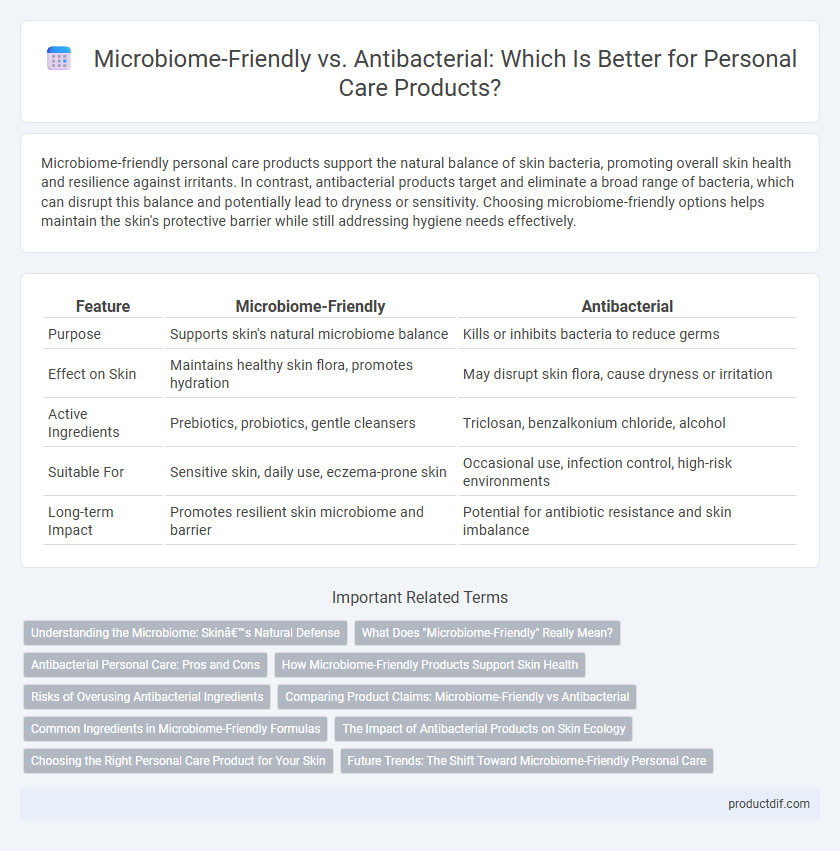Microbiome-friendly personal care products support the natural balance of skin bacteria, promoting overall skin health and resilience against irritants. In contrast, antibacterial products target and eliminate a broad range of bacteria, which can disrupt this balance and potentially lead to dryness or sensitivity. Choosing microbiome-friendly options helps maintain the skin's protective barrier while still addressing hygiene needs effectively.
Table of Comparison
| Feature | Microbiome-Friendly | Antibacterial |
|---|---|---|
| Purpose | Supports skin's natural microbiome balance | Kills or inhibits bacteria to reduce germs |
| Effect on Skin | Maintains healthy skin flora, promotes hydration | May disrupt skin flora, cause dryness or irritation |
| Active Ingredients | Prebiotics, probiotics, gentle cleansers | Triclosan, benzalkonium chloride, alcohol |
| Suitable For | Sensitive skin, daily use, eczema-prone skin | Occasional use, infection control, high-risk environments |
| Long-term Impact | Promotes resilient skin microbiome and barrier | Potential for antibiotic resistance and skin imbalance |
Understanding the Microbiome: Skin’s Natural Defense
Microbiome-friendly personal care products support the skin's natural defense by preserving beneficial bacteria that maintain pH balance and protect against pathogens. Antibacterial products, while effective in reducing harmful microbes, can disrupt this delicate ecosystem, potentially leading to skin irritation and weakened immunity. Prioritizing microbiome-friendly formulations helps sustain healthy skin flora and long-term skin resilience.
What Does "Microbiome-Friendly" Really Mean?
Microbiome-friendly personal care products support the balance of beneficial skin microorganisms, preserving the natural ecosystem that protects against harmful pathogens and maintains skin health. Unlike antibacterial products that kill a broad spectrum of bacteria, often disrupting this delicate microbial balance, microbiome-friendly formulations use gentle ingredients to nurture and enhance the skin's native microbiota. These products aim to promote long-term skin resilience, hydration, and barrier function by fostering a diverse and stable microbial community.
Antibacterial Personal Care: Pros and Cons
Antibacterial personal care products effectively reduce harmful bacteria on skin surfaces, contributing to infection prevention and improved hygiene. However, overuse can disrupt the natural skin microbiome, potentially leading to reduced skin barrier function and increased susceptibility to irritation or antibiotic-resistant bacteria. Balancing antibacterial efficacy with microbiome preservation is essential to maintain healthy skin and overall microbial diversity.
How Microbiome-Friendly Products Support Skin Health
Microbiome-friendly personal care products promote skin health by maintaining the natural balance of beneficial bacteria, which strengthens the skin's protective barrier and reduces inflammation. Unlike antibacterial products that can disrupt this delicate ecosystem by eradicating both harmful and beneficial microbes, microbiome-friendly formulations support microbial diversity crucial for immune defense and hydration. By preserving the skin's microbiota, these products enhance resilience against environmental stressors and improve overall skin vitality.
Risks of Overusing Antibacterial Ingredients
Overusing antibacterial ingredients in personal care products can disrupt the natural skin microbiome, leading to imbalances that weaken the skin's barrier function and increase susceptibility to infections. Frequent exposure to antibacterial agents may promote the development of resistant bacterial strains, posing long-term health risks. Microbiome-friendly formulations support the skin's beneficial bacteria, maintaining a balanced environment essential for healthy skin.
Comparing Product Claims: Microbiome-Friendly vs Antibacterial
Microbiome-friendly personal care products emphasize maintaining the natural balance of skin microorganisms, supporting beneficial bacteria to enhance skin health and resilience. In contrast, antibacterial products claim to eliminate or reduce harmful bacteria, often using agents like triclosan or chlorhexidine, which can disrupt the skin's microbial ecosystem. Consumers seeking gentle, long-term skin wellness may prefer microbiome-friendly options, while those prioritizing immediate germ elimination might opt for antibacterial variants.
Common Ingredients in Microbiome-Friendly Formulas
Microbiome-friendly personal care products typically contain prebiotics, like inulin and fructooligosaccharides, which support beneficial skin bacteria growth, as well as soothing agents such as aloe vera and chamomile extract. These formulations avoid harsh antibacterial compounds like triclosan and benzalkonium chloride that can disrupt the natural skin microbiota. Ingredients rich in moisturizing humectants, including glycerin and hyaluronic acid, are also common to maintain the skin barrier and promote a balanced microbiome environment.
The Impact of Antibacterial Products on Skin Ecology
Antibacterial products disrupt the natural skin microbiome by eliminating both harmful and beneficial bacteria, leading to imbalanced skin ecology and increased susceptibility to irritation and infections. Microbiome-friendly personal care products support the growth of beneficial skin microbes, maintaining a healthy barrier and enhancing skin resilience. Preserving the skin's microbial diversity is crucial for optimal skin health and protection against pathogenic invasion.
Choosing the Right Personal Care Product for Your Skin
Choosing the right personal care product for your skin involves understanding the benefits of microbiome-friendly formulations versus antibacterial options. Microbiome-friendly products support the natural balance of skin flora, promoting healthy barrier function and reducing irritation. Antibacterial products, while effective at eliminating harmful bacteria, can disrupt the skin's microbiome and cause dryness or sensitivity with prolonged use.
Future Trends: The Shift Toward Microbiome-Friendly Personal Care
The personal care industry is increasingly embracing microbiome-friendly formulations that support the skin's natural balance rather than eliminating all bacteria like traditional antibacterial products. Advances in probiotic and prebiotic ingredients promote healthy microbial diversity, enhancing skin barrier function and reducing irritation. Future trends indicate a strong consumer preference for products that nurture the microbiome, driven by growing awareness of the long-term benefits for skin health and sustainability.
Microbiome-friendly vs antibacterial Infographic

 productdif.com
productdif.com